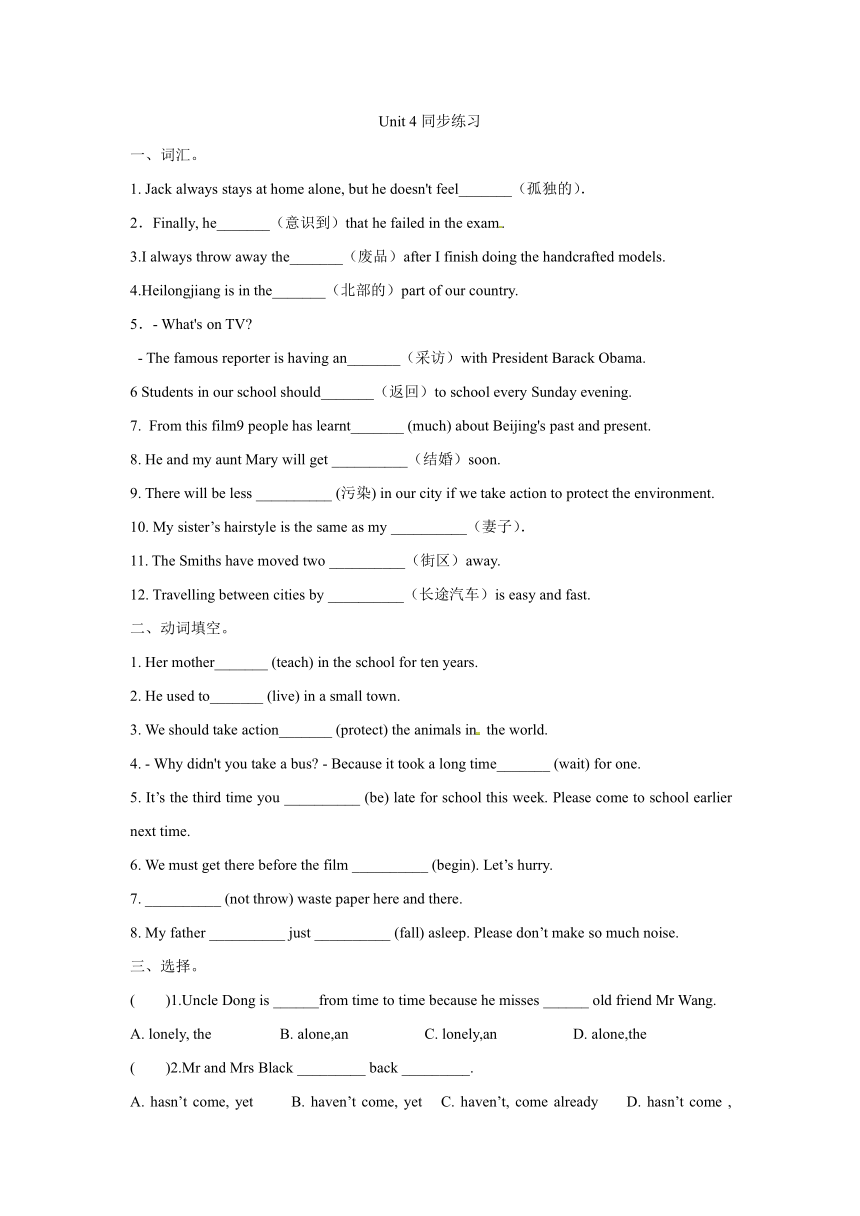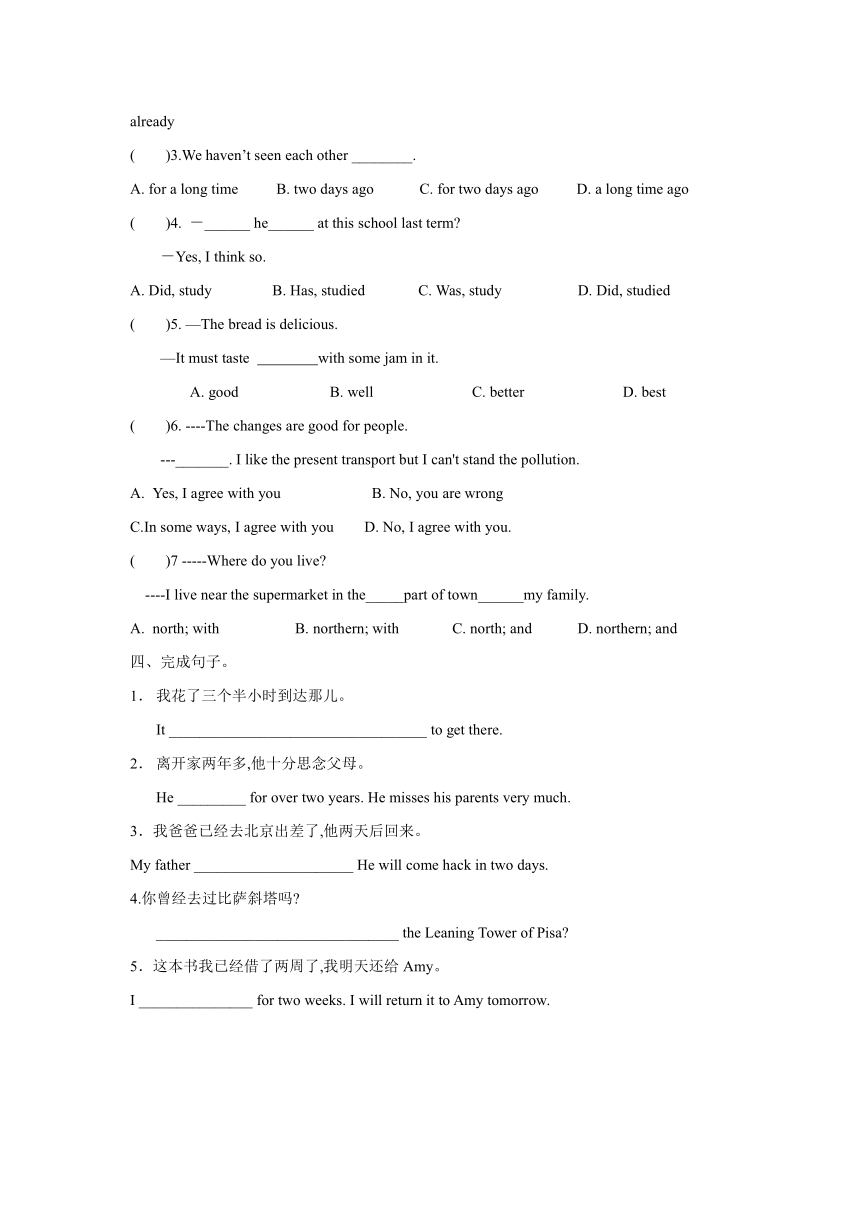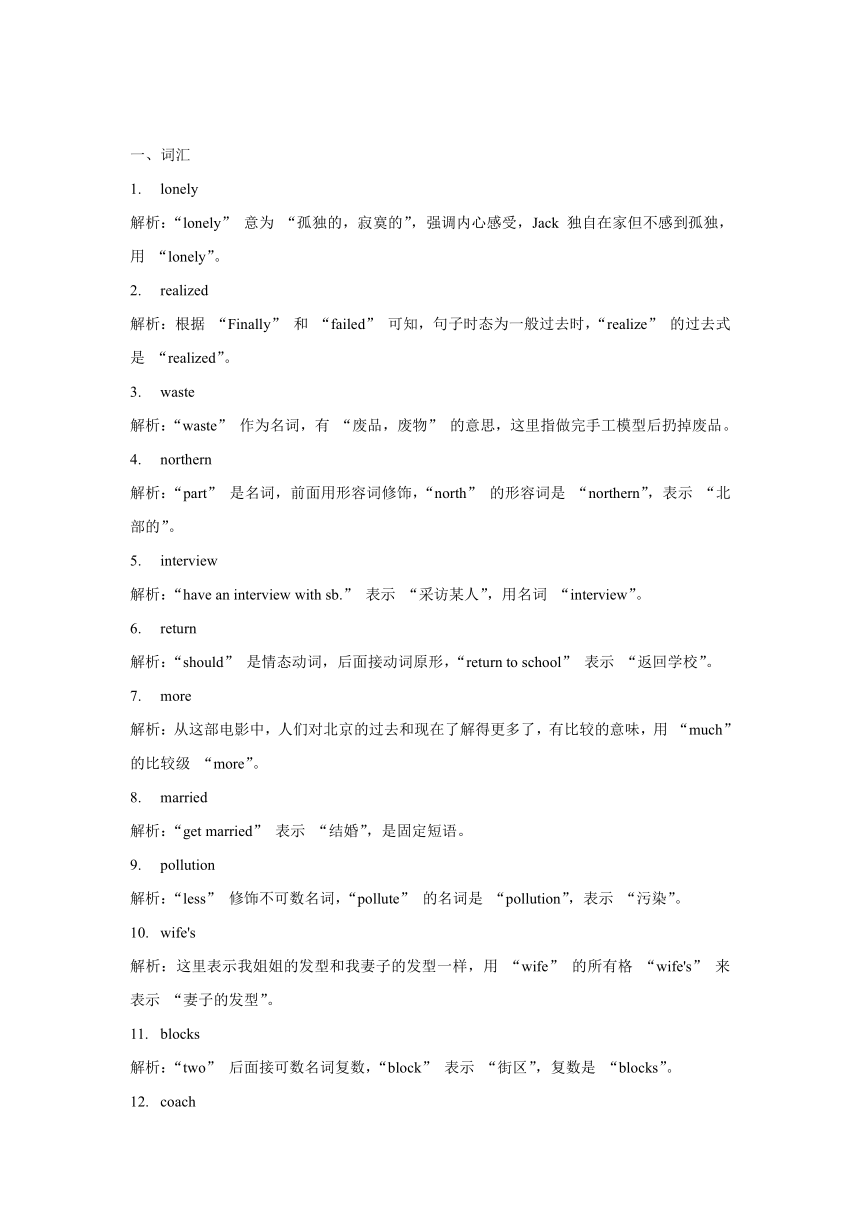Unit4 A good read同步练习(含答案)牛津译林版八年级英语下册
文档属性
| 名称 | Unit4 A good read同步练习(含答案)牛津译林版八年级英语下册 |  | |
| 格式 | docx | ||
| 文件大小 | 32.9KB | ||
| 资源类型 | 教案 | ||
| 版本资源 | 牛津译林版 | ||
| 科目 | 英语 | ||
| 更新时间 | 2025-02-12 20:02:54 | ||
图片预览



文档简介
Unit 4同步练习
词汇。
1. Jack always stays at home alone, but he doesn't feel_______(孤独的).
2.Finally, he_______(意识到)that he failed in the exam.
3.I always throw away the_______(废品)after I finish doing the handcrafted models.
4.Heilongjiang is in the_______(北部的)part of our country.
5.- What's on TV
- The famous reporter is having an_______(采访)with President Barack Obama.
6 Students in our school should_______(返回)to school every Sunday evening.
From this film9 people has learnt_______ (much) about Beijing's past and present.
8. He and my aunt Mary will get __________(结婚)soon.
9. There will be less __________ (污染) in our city if we take action to protect the environment.
10. My sister’s hairstyle is the same as my __________(妻子).
11. The Smiths have moved two __________(街区)away.
12. Travelling between cities by __________(长途汽车)is easy and fast.
动词填空。
1. Her mother_______ (teach) in the school for ten years.
2. He used to_______ (live) in a small town.
3. We should take action_______ (protect) the animals in the world.
4. - Why didn't you take a bus - Because it took a long time_______ (wait) for one.
5. It’s the third time you __________ (be) late for school this week. Please come to school earlier next time.
6. We must get there before the film __________ (begin). Let’s hurry.
7. __________ (not throw) waste paper here and there.
8. My father __________ just __________ (fall) asleep. Please don’t make so much noise.
选择。
( )1.Uncle Dong is ______from time to time because he misses ______ old friend Mr Wang.
A. lonely, the B. alone,an C. lonely,an D. alone,the
( )2.Mr and Mrs Black _________ back _________.
A. hasn’t come, yet B. haven’t come, yet C. haven’t, come already D. hasn’t come , already
( )3.We haven’t seen each other ________.
A. for a long time B. two days ago C. for two days ago D. a long time ago
( )4. -______ he______ at this school last term
-Yes, I think so.
A. Did, study B. Has, studied C. Was, study D. Did, studied
( )5. —The bread is delicious.
—It must taste with some jam in it.
A. good B. well C. better D. best
( )6. ----The changes are good for people.
---_______. I like the present transport but I can't stand the pollution.
Yes, I agree with you B. No, you are wrong
C.In some ways, I agree with you D. No, I agree with you.
( )7 -----Where do you live
----I live near the supermarket in the_____part of town______my family.
north; with B. northern; with C. north; and D. northern; and
完成句子。
我花了三个半小时到达那儿。
It __________________________________ to get there.
离开家两年多,他十分思念父母。
He _________ for over two years. He misses his parents very much.
3.我爸爸已经去北京出差了,他两天后回来。
My father _____________________ He will come hack in two days.
4.你曾经去过比萨斜塔吗
________________________________ the Leaning Tower of Pisa
5.这本书我已经借了两周了,我明天还给Amy。
I _______________ for two weeks. I will return it to Amy tomorrow.
一、词汇
1. lonely
解析:“lonely” 意为 “孤独的,寂寞的”,强调内心感受,Jack 独自在家但不感到孤独,用 “lonely”。
2. realized
解析:根据 “Finally” 和 “failed” 可知,句子时态为一般过去时,“realize” 的过去式是 “realized”。
3. waste
解析:“waste” 作为名词,有 “废品,废物” 的意思,这里指做完手工模型后扔掉废品。
4. northern
解析:“part” 是名词,前面用形容词修饰,“north” 的形容词是 “northern”,表示 “北部的”。
5. interview
解析:“have an interview with sb.” 表示 “采访某人”,用名词 “interview”。
6. return
解析:“should” 是情态动词,后面接动词原形,“return to school” 表示 “返回学校”。
7. more
解析:从这部电影中,人们对北京的过去和现在了解得更多了,有比较的意味,用 “much” 的比较级 “more”。
8. married
解析:“get married” 表示 “结婚”,是固定短语。
9. pollution
解析:“less” 修饰不可数名词,“pollute” 的名词是 “pollution”,表示 “污染”。
10. wife's
解析:这里表示我姐姐的发型和我妻子的发型一样,用 “wife” 的所有格 “wife's” 来表示 “妻子的发型”。
11. blocks
解析:“two” 后面接可数名词复数,“block” 表示 “街区”,复数是 “blocks”。
12. coach
解析:“by coach” 表示 “乘长途汽车”,是固定搭配。
二、动词填空
1. has taught
解析:“for ten years” 表示一段时间,常与现在完成时连用,“Her mother” 是第三人称单数,助动词用 “has”,“teach” 的过去分词是 “taught”。
2. live
解析:“used to do sth.” 表示 “过去常常做某事”,后面接动词原形,所以用 “live”。
3. to protect
解析:“take action to do sth.” 表示 “采取行动做某事”,用动词不定式作目的状语,所以用 “to protect”。
4. to wait
解析:“It takes/took (sb.) some time to do sth.” 表示 “(某人)花费多长时间做某事”,用动词不定式,所以用 “to wait”。
5. have been
解析:“It is/was the + 序数词 + time + that 从句” 结构中,若前面是 “is”,从句用现在完成时;若前面是 “was”,从句用过去完成时。这里前面是 “is”,“you” 作主语,助动词用 “have”,“be” 的过去分词是 “been”。
6. begins
解析:“before” 引导时间状语从句,遵循 “主将从现” 原则,主句是 “must get”,从句用一般现在时,“the film” 是第三人称单数,“begin” 的第三人称单数是 “begins”。
7. Don't throw
解析:这是一个祈使句的否定形式,以 “Don't + 动词原形” 开头,所以用 “Don't throw”。
8. has; fallen
解析:根据 “Please don’t make so much noise.” 可知,爸爸刚刚睡着了,强调过去的动作对现在造成的影响,用现在完成时,“My father” 是第三人称单数,助动词用 “has”,“fall” 的过去分词是 “fallen”。
三、选择
1. 答案:C
解析:“lonely” 强调内心感受,“alone” 强调独自一人,第一空表示董叔叔时不时感到孤独,用 “lonely”;“old” 是以元音音素开头的单词,“an” 用于元音音素开头的单词前,“an old friend” 表示 “一位老朋友”,故选 C。
2. 答案:B
解析:“Mr and Mrs Black” 是复数,助动词用 “have”,否定形式是 “haven't”,“yet” 常用于否定句和疑问句,“already” 常用于肯定句,这里是否定句,用 “yet”,故选 B。
3. 答案:A
解析:“for a long time” 表示一段时间,常与现在完成时连用;“two days ago” 和 “a long time ago” 是过去的时间,用于一般过去时;“for two days ago” 表述错误,故选 A。
4. 答案:A
解析:“last term” 是过去的时间,句子用一般过去时,一般过去时的一般疑问句借助助动词 “Did”,动词还原为原形,故选 A。
5. 答案:C
解析:面包本身很美味,加了果酱后会尝起来更好,有比较的含义,用 “good” 的比较级 “better”,“taste” 是感官动词,后面接形容词,“well” 作形容词时表示 “身体好”,不符合语境,“best” 是最高级,这里没有三者或三者以上的比较,故选 C。
6. 答案:C
解析:根据 “I like the present transport but I can't stand the pollution.” 可知,在某些方面同意对方的观点,A 选项 “是的,我同意你” 太绝对;B 选项 “不,你错了” 与后面表达不符;D 选项表述错误,C 选项 “在某些方面,我同意你” 符合语境,故选 C。
7. 答案:B
解析:“part” 是名词,前面用形容词 “northern” 修饰,“和某人一起” 用 “with sb.”,“and” 连接两个并列的成分,这里表示和家人一起,用 “with”,故选 B。
四、完成句子
1. took me three and a half hours
解析:“It takes/took (sb.) some time to do sth.” 表示 “(某人)花费多长时间做某事”,“三个半小时” 可以表达为 “three and a half hours”,根据语境,这里用一般过去时,“took”。
2. has been away from home
解析:“for over two years” 表示一段时间,“leave” 是短暂性动词,不能和一段时间连用,要转化为延续性动词短语 “be away from”,用现在完成时,“He” 是第三人称单数,助动词用 “has”。
3. has gone to Beijing on business
解析:“have/has gone to” 表示 “去了某地(还没回来)”,“on business” 表示 “出差”,“My father” 是第三人称单数,助动词用 “has”。
4. Have you ever been to
解析:“have/has been to” 表示 “去过某地(已经回来)”,“ever” 表示 “曾经”,一般疑问句将 “Have/Has” 提前,“you” 作主语,用 “Have”。
5. have kept the book
解析:“for two weeks” 表示一段时间,“borrow” 是短暂性动词,不能和一段时间连用,要转化为延续性动词 “keep”,用现在完成时,“I” 作主语,助动词用 “have”。
词汇。
1. Jack always stays at home alone, but he doesn't feel_______(孤独的).
2.Finally, he_______(意识到)that he failed in the exam.
3.I always throw away the_______(废品)after I finish doing the handcrafted models.
4.Heilongjiang is in the_______(北部的)part of our country.
5.- What's on TV
- The famous reporter is having an_______(采访)with President Barack Obama.
6 Students in our school should_______(返回)to school every Sunday evening.
From this film9 people has learnt_______ (much) about Beijing's past and present.
8. He and my aunt Mary will get __________(结婚)soon.
9. There will be less __________ (污染) in our city if we take action to protect the environment.
10. My sister’s hairstyle is the same as my __________(妻子).
11. The Smiths have moved two __________(街区)away.
12. Travelling between cities by __________(长途汽车)is easy and fast.
动词填空。
1. Her mother_______ (teach) in the school for ten years.
2. He used to_______ (live) in a small town.
3. We should take action_______ (protect) the animals in the world.
4. - Why didn't you take a bus - Because it took a long time_______ (wait) for one.
5. It’s the third time you __________ (be) late for school this week. Please come to school earlier next time.
6. We must get there before the film __________ (begin). Let’s hurry.
7. __________ (not throw) waste paper here and there.
8. My father __________ just __________ (fall) asleep. Please don’t make so much noise.
选择。
( )1.Uncle Dong is ______from time to time because he misses ______ old friend Mr Wang.
A. lonely, the B. alone,an C. lonely,an D. alone,the
( )2.Mr and Mrs Black _________ back _________.
A. hasn’t come, yet B. haven’t come, yet C. haven’t, come already D. hasn’t come , already
( )3.We haven’t seen each other ________.
A. for a long time B. two days ago C. for two days ago D. a long time ago
( )4. -______ he______ at this school last term
-Yes, I think so.
A. Did, study B. Has, studied C. Was, study D. Did, studied
( )5. —The bread is delicious.
—It must taste with some jam in it.
A. good B. well C. better D. best
( )6. ----The changes are good for people.
---_______. I like the present transport but I can't stand the pollution.
Yes, I agree with you B. No, you are wrong
C.In some ways, I agree with you D. No, I agree with you.
( )7 -----Where do you live
----I live near the supermarket in the_____part of town______my family.
north; with B. northern; with C. north; and D. northern; and
完成句子。
我花了三个半小时到达那儿。
It __________________________________ to get there.
离开家两年多,他十分思念父母。
He _________ for over two years. He misses his parents very much.
3.我爸爸已经去北京出差了,他两天后回来。
My father _____________________ He will come hack in two days.
4.你曾经去过比萨斜塔吗
________________________________ the Leaning Tower of Pisa
5.这本书我已经借了两周了,我明天还给Amy。
I _______________ for two weeks. I will return it to Amy tomorrow.
一、词汇
1. lonely
解析:“lonely” 意为 “孤独的,寂寞的”,强调内心感受,Jack 独自在家但不感到孤独,用 “lonely”。
2. realized
解析:根据 “Finally” 和 “failed” 可知,句子时态为一般过去时,“realize” 的过去式是 “realized”。
3. waste
解析:“waste” 作为名词,有 “废品,废物” 的意思,这里指做完手工模型后扔掉废品。
4. northern
解析:“part” 是名词,前面用形容词修饰,“north” 的形容词是 “northern”,表示 “北部的”。
5. interview
解析:“have an interview with sb.” 表示 “采访某人”,用名词 “interview”。
6. return
解析:“should” 是情态动词,后面接动词原形,“return to school” 表示 “返回学校”。
7. more
解析:从这部电影中,人们对北京的过去和现在了解得更多了,有比较的意味,用 “much” 的比较级 “more”。
8. married
解析:“get married” 表示 “结婚”,是固定短语。
9. pollution
解析:“less” 修饰不可数名词,“pollute” 的名词是 “pollution”,表示 “污染”。
10. wife's
解析:这里表示我姐姐的发型和我妻子的发型一样,用 “wife” 的所有格 “wife's” 来表示 “妻子的发型”。
11. blocks
解析:“two” 后面接可数名词复数,“block” 表示 “街区”,复数是 “blocks”。
12. coach
解析:“by coach” 表示 “乘长途汽车”,是固定搭配。
二、动词填空
1. has taught
解析:“for ten years” 表示一段时间,常与现在完成时连用,“Her mother” 是第三人称单数,助动词用 “has”,“teach” 的过去分词是 “taught”。
2. live
解析:“used to do sth.” 表示 “过去常常做某事”,后面接动词原形,所以用 “live”。
3. to protect
解析:“take action to do sth.” 表示 “采取行动做某事”,用动词不定式作目的状语,所以用 “to protect”。
4. to wait
解析:“It takes/took (sb.) some time to do sth.” 表示 “(某人)花费多长时间做某事”,用动词不定式,所以用 “to wait”。
5. have been
解析:“It is/was the + 序数词 + time + that 从句” 结构中,若前面是 “is”,从句用现在完成时;若前面是 “was”,从句用过去完成时。这里前面是 “is”,“you” 作主语,助动词用 “have”,“be” 的过去分词是 “been”。
6. begins
解析:“before” 引导时间状语从句,遵循 “主将从现” 原则,主句是 “must get”,从句用一般现在时,“the film” 是第三人称单数,“begin” 的第三人称单数是 “begins”。
7. Don't throw
解析:这是一个祈使句的否定形式,以 “Don't + 动词原形” 开头,所以用 “Don't throw”。
8. has; fallen
解析:根据 “Please don’t make so much noise.” 可知,爸爸刚刚睡着了,强调过去的动作对现在造成的影响,用现在完成时,“My father” 是第三人称单数,助动词用 “has”,“fall” 的过去分词是 “fallen”。
三、选择
1. 答案:C
解析:“lonely” 强调内心感受,“alone” 强调独自一人,第一空表示董叔叔时不时感到孤独,用 “lonely”;“old” 是以元音音素开头的单词,“an” 用于元音音素开头的单词前,“an old friend” 表示 “一位老朋友”,故选 C。
2. 答案:B
解析:“Mr and Mrs Black” 是复数,助动词用 “have”,否定形式是 “haven't”,“yet” 常用于否定句和疑问句,“already” 常用于肯定句,这里是否定句,用 “yet”,故选 B。
3. 答案:A
解析:“for a long time” 表示一段时间,常与现在完成时连用;“two days ago” 和 “a long time ago” 是过去的时间,用于一般过去时;“for two days ago” 表述错误,故选 A。
4. 答案:A
解析:“last term” 是过去的时间,句子用一般过去时,一般过去时的一般疑问句借助助动词 “Did”,动词还原为原形,故选 A。
5. 答案:C
解析:面包本身很美味,加了果酱后会尝起来更好,有比较的含义,用 “good” 的比较级 “better”,“taste” 是感官动词,后面接形容词,“well” 作形容词时表示 “身体好”,不符合语境,“best” 是最高级,这里没有三者或三者以上的比较,故选 C。
6. 答案:C
解析:根据 “I like the present transport but I can't stand the pollution.” 可知,在某些方面同意对方的观点,A 选项 “是的,我同意你” 太绝对;B 选项 “不,你错了” 与后面表达不符;D 选项表述错误,C 选项 “在某些方面,我同意你” 符合语境,故选 C。
7. 答案:B
解析:“part” 是名词,前面用形容词 “northern” 修饰,“和某人一起” 用 “with sb.”,“and” 连接两个并列的成分,这里表示和家人一起,用 “with”,故选 B。
四、完成句子
1. took me three and a half hours
解析:“It takes/took (sb.) some time to do sth.” 表示 “(某人)花费多长时间做某事”,“三个半小时” 可以表达为 “three and a half hours”,根据语境,这里用一般过去时,“took”。
2. has been away from home
解析:“for over two years” 表示一段时间,“leave” 是短暂性动词,不能和一段时间连用,要转化为延续性动词短语 “be away from”,用现在完成时,“He” 是第三人称单数,助动词用 “has”。
3. has gone to Beijing on business
解析:“have/has gone to” 表示 “去了某地(还没回来)”,“on business” 表示 “出差”,“My father” 是第三人称单数,助动词用 “has”。
4. Have you ever been to
解析:“have/has been to” 表示 “去过某地(已经回来)”,“ever” 表示 “曾经”,一般疑问句将 “Have/Has” 提前,“you” 作主语,用 “Have”。
5. have kept the book
解析:“for two weeks” 表示一段时间,“borrow” 是短暂性动词,不能和一段时间连用,要转化为延续性动词 “keep”,用现在完成时,“I” 作主语,助动词用 “have”。
